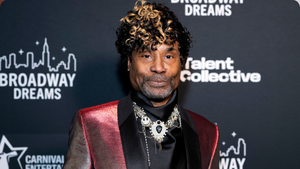Republicans have controlled Florida’s state government for Nate Douglas’s entire life. The Democratic candidate for Florida House would like the state to shift a different direction, of course. But growing up Black and gay in Orlando, the now-23-year-old felt for most of his life that the state was more socially liberal than it may seem to outsiders.
“It’s been a more libertarian state. That’s more the word I would use,” Douglas says. But he acknowledges the state in recent years took a sharp turn under Florida Gov. Ron DeSantis.
“Right now, we’re just not seeing that," he says. "Right now, we’re seeing a large push for authoritarianism, where we have the state government telling people how they can live their lives, who they can love, how they can express themselves. It has felt very shameful, and it felt scary as well.”
But Douglas won’t cower in response to right-wing forces in the government. Within months of graduating from the University of Florida, he filed in Florida House District 37.
He’s taking on Republican incumbent Susan Plasencia, who two years ago unseated Rep. Carlos Guillermo Smith, Florida’s first gay Latine lawmaker. Plasencia’s voting record since landed her on Agenda PAC’s “hate squad,” identifying her as one of the most “beatable bigots” in the country.
Will the east Orlando community that turned Smith out two years ago elect another queer person of color to office in 2024? Douglas has every reason to feel confident, and he suggests Plasencia only found success in 2022 based on some political luck. Halfway through President Joe Biden’s first term, Republicans may not have enjoyed much of a nationwide wave in the midterms, but one hit Florida. DeSantis won reelection by 19 percentage points four years after winning by a recount margin, and Republicans won supermajorities in the Florida House and Senate.
There was historically low turnout, Douglas says. He notes the voting population for the district, which includes the University of Central Florida, is among the youngest in the state, with a high minority population.
“They don’t get the same amount of education when it comes to voting, and then we see a high level of voter suppression in the state of Florida as well,” Douglas says. “We see a lot of people who are either scared to vote or they’re disengaged because they are not getting the same level of education as voters in different districts with a higher income level.”
This year, though, could see a very different turnout, he says. It’s a presidential election year, and voters in the region feel angry over Plasencia’s voting record. She voted to expand Florida’s “don’t say gay” law and voted to eliminate diversity, equity, and inclusion programs at Florida universities, including UCF.
“She is, dare I say it — and it might frustrate Republicans — but she is homophobic,” Douglas says, “and we have a bunch of bigoted folks like her in the state legislature at the moment.”
Douglas likes to think he represents a brighter future. He comes from a somewhat modest background. His parents met while his father was working at Epcot and his mother was studying abroad and visiting the theme park. He was born in Celebration, a Disney-planned town, but eventually ended up going to high school across town in Apopka thanks to a magnet engineering program there.
He was in high school when a self-proclaimed ISIS terrorist killed 49 people at Pulse, a gay nightclub in Orlando, in 2016. That’s still the deadliest attack on LGBTQ+ people in U.S. history and certainly a sad sight for a queer teenager in the community. But he remembers a sense of pride in central Florida’s response to the attack.
“It was definitely a sad moment. But you know, in the aftermath of that, I was very proud of the way that folks here in Orlando really came together, and we really stood with each other against hate,” Douglas says. “And then we also saw, even in the state legislature, some folks putting differences aside to combat hate in the state of Florida.”
That’s a far cry from Florida under DeSantis, who this year defunded arts grants purportedly out of fear that they may be used on LGBTQ+ content at local fringe festivals.
“In the state of Florida, it feels like we've been going backwards, and it feels like so many folks are unable to afford living in the state of Florida,” Douglas says, “but we've just been so focused on spreading hate for the LGBTQ+ community in a way that I have never seen in my life since the Pulse shooting.”
As upsetting as this advancement in bigotry has been, it’s all the worse, Douglas says, that the culture wars have taken priority over such issues as a property insurance crisis and addressing climate change. Douglas notably spoke to The Advocate after Hurricane Helene devastated Florida’s Gulf Coast and right before Hurricane Milton carved through central Florida, including in Douglas’s Orlando community.
Douglas has reason to be optimistic about the election. The most recent financial reports show he has more than twice the cash on hand as Plasencia, and he’s running in a district where 55 percent of voters favored Biden in the last presidential election over Donald Trump. But he urges voters not to be complacent about this election, not to mention the critical presidential election.
“When you go out there and you vote, make sure you take at least five friends with you the polls, because this is going to be one of the most important elections,” Douglas says. “It's an election where we're not only talking about the future of our democracy, it's also an election where we're talking about making sure that those at the top are paying their fair share. And we're talking about making sure that people can finally afford health care, that they could finally afford housing.
“Because right now, the folks in Tallahassee who are there, on the Republican side specifically, they are bought and they are paid for, and it's time to vote them out.”




































































Charlie Kirk DID say stoning gay people was the 'perfect law' — and these other heinous quotes